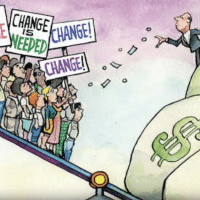-
The informal empire of London
The division of the world is not only by classes, but by North and South as well. And unfortunately the British left does not realise that, and the framing of being anti-neoliberal, in contrast to anti-imperialist, denies this differentiated reality.
-
Social Security may bust the Federal budget – but not how you think
Both Democrats and Republicans have used social security funds to hide government debt—i.e., to trick the public. This was made possible by a huge surplus engineered by fund actuaries to account for baby boomers. In the next few years the fund will need to cash in on its bonds and this will cause the federal debt to balloon.
-
Secular Stagnation
The fundamental changes I would advocate are those that would: dramatically boost worker power; secure a progressive and growing funding base for a needed expansion of public housing and infrastructure and public spending on health care, education, and transportation; and end the production and use of fossil fuels and significantly reduce greenhouse emissions.
-
W. E. B. Du Bois’s revolutions
“Capitalism cannot reform itself; it is doomed to self-destruction. No universal selfishness can bring social good to all. Communism—the effort to give all men what they need and to ask of each the best they can contribute—this is the only way of human life.” With this sober stroke of his insurgent pen, the 93-year-old scholar joined the Communist Party.
-
When you reject class-based politics
If you reject from the outset the idea of uniting a majority based on shared economic interests, then pretty much all you’ve got left is the “thoughtful and humane co-optation” of racism and xenophobia.
-
The U.S. is where the rich are the richest
In the U.S., where wealth is most highly concentrated, almost a quarter of income goes to the rich. So it should come as no surprise that a big chunk of the world’s richest call America home. Two out of five millionaires and billionaires live there, and their ranks are growing fast.
-
Finance, Crisis, and Stagnation
In this presentation Mexie begins to elaborate the theory of monopoly capitalism developed by Paul Baran and Paul Sweezy, incorporating recent theoretical development by John Bellamy Foster and Robert McChesney. Mexie has produced a number of other videos on the topic as well.
-
The only force that can combat imperialism today is a worldwide struggle of workers
Marxism as a philosophy of praxis is inescapable, since it sums up the revolutionary potential for human emancipation and sustainable human development.
-
With Capitulation in Greece, the Front Moves Outward
Since at least the beginning of this year, the project of achieving a decent, reasonable Europe had set its eyes on Greece. I say nothing of radically transforming Europe into something just and fair and ecologically sound — that prospect is far beyond the present horizon — but hopes that Europe could slowly turn […]
-
Lessons from a defeat in Europe
The Troika are celebrating the end of negotiations with Greece, proclaiming that thanks to their tireless efforts the Eurozone remains whole. And why wouldn’t they celebrate? They have demonstrated their power to crush, at least for now, the Greek effort to end austerity and its associated devastating social consequences. Tragically, Syriza has not only surrendered, […]
-
Unending Hard Times: Whose Is the Toil and Whose Is the Wealth?
John Bellamy Foster and Robert W McChesney. The Endless Crisis: How Monopoly-Finance Capital Produces Stagnation and Upheaval from the USA to China. New York: Monthly Review Press, 2012; Kharagpur, India: Cornerstone Publications, 2013. pp x + 227. Rs 150. The secular decline of decadal average annual real gross domestic product (GDP) growth rates of the […]
-
Marta Harnecker on New Paths Toward 21st Century Socialism
Introduction by Richard Fidler Among the many panels and plenaries at the Conference of the Society for Socialist Studies, which met in Ottawa June 2-5, was a Book Launch for Marta Harnecker’s latest English-language book, A World to Build: New Paths toward Twenty-First Century Socialism (translated by Federico Fuentes), Monthly Review Press. The featured speaker […]
-
A Dictionary of American Free Enterprise
Arms Sales A government jobs program (the lone acceptable government jobs program) working to deliver all the latest in U.S. defense industry hardware to all the international “good guys.” Associate A low-wage worker. Bubble (Financial) The artificial inflation of asset prices, which, although appearing to many of the “smartest people in the room” as if […]
-
Thousands of Greeks Take to the Streets . . . and Chant the Name of Their Finance Minister
“Has there ever been a demonstration where people chanted the name of a finance minister? This must be a world first!” says the ironic Xenia, a 53-year-old woman who has been shouting for several minutes, with thousands of demonstrators, the now omnipresent name in Athens: “Yanis Varoufakis, Yanis Varoufakis, Yanis Varoufakis!”
-
Thomas Piketty’s Capital in the Twenty-First Century: Its Uses and Limits
Thomas Piketty. Capital in the Twenty-First Century. Cambridge: The Belknap Press of Harvard University Press, 2014. $39.95. Capital in the Twenty-First Century by Thomas Piketty has caused a stir, which it deserves. Capital 21, as we will abbreviate the title, grapples with a prominent current issue: outrageously unequal incomes and wealth. It is a data-rich, […]
-
As a Class for Itself
Numsa General Secretary’s Presentation to the Cape Town Press Club, February 11, 2014 I speak to you today with a powerful and united mandate from 341,150 metalworkers. They made their views extremely clear in our workers’ parliament in December last year — the parliament we called the Numsa Special National Congress. In that parliament […]
-
“The Death of Social Democracy in the Age of Global Monopoly-Finance Capital”: An Interview with John Bellamy Foster
Tassos Tsakiroglou: How urgent do you consider the necessity to develop an understanding of the interconnections between the deepening impasse of the capitalist economy and the rapidly accelerating ecological threat? John Bellamy Foster: The urgency of understanding the interconnections between the economic impassse and the ecological emergency derives from the combined threats they pose to […]
-
Two Transitions in Brazil: Dilemmas of a Neoliberal Democracy
This article reviews the background and the implications of two transitions in Brazil: the political transition from a military regime (1964-85) to democracy (1985-present), and the economic transition from import-substituting industrialization (ISI, 1930-80) to neoliberalism (1990-present). It subsequently examines how neoliberal economic policies were implemented in a democracy, under the centre-right administrations led by Fernando Henrique Cardoso (1995-98, 1998-2002), and the centre-left administrations led by Luís Inácio Lula da Silva (Lula, 2003-06, 2007-10) and Dilma Rousseff (2011-present). The article concludes with a reflection about the limitations of these policies and of neoliberal democracy more generally.
-
An Interview with John Bellamy Foster (for the Sunday Eleftherotypia)
CJP: What began as a financial crisis in 2007 has become one of the biggest unemployment crises in the advanced capitalist world. Could this perhaps mean that the crisis of 2007-08 was not actually caused by finance itself but had its underlying causes in the real economy? JBF: No one doubts that it was […]
-
Crises of Capitalism and Social Democracy
John Bellamy Foster is best-known as author of Marx’s Ecology (2000; in which he corrects the popular misapprehension that Marx did not ‘get’ environmental limits), and as editor of Monthly Review (monthlyreview.org), the journal founded by Marxist economist Paul Sweezy in the late 1940s. In his latest book, The Endless Crisis (2012; written with […]







